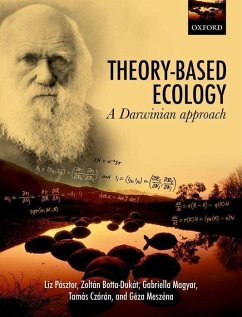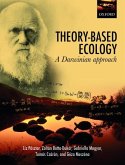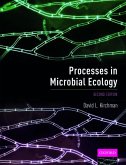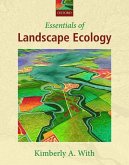Liz Pasztor (, Department of Genetics, Eotvos University), Zoltan Botta-Dukat (MTA Centre for Ecological Research ), Gabriella Magyar (, Formerly of Department of Plant Systematics, Ec
Theory-Based Ecology
A Darwinian Approach
Liz Pasztor (, Department of Genetics, Eotvos University), Zoltan Botta-Dukat (MTA Centre for Ecological Research ), Gabriella Magyar (, Formerly of Department of Plant Systematics, Ec
Theory-Based Ecology
A Darwinian Approach
- Broschiertes Buch
- Merkliste
- Auf die Merkliste
- Bewerten Bewerten
- Teilen
- Produkt teilen
- Produkterinnerung
- Produkterinnerung
The first text to adopt a Darwinian approach to develop a universal, coherent and robust theory of ecology and provide a unified treatment of ecology and evolution.
Andere Kunden interessierten sich auch für
![Theory-Based Ecology Theory-Based Ecology]() Liz PasztorTheory-Based Ecology166,99 €
Liz PasztorTheory-Based Ecology166,99 €![Freshwater Ecology and Conservation Freshwater Ecology and Conservation]() Freshwater Ecology and Conservation81,99 €
Freshwater Ecology and Conservation81,99 €![Processes in Microbial Ecology Processes in Microbial Ecology]() David L. Kirchman (Maxwell P. and Mildred H. Harrington Professor oProcesses in Microbial Ecology149,99 €
David L. Kirchman (Maxwell P. and Mildred H. Harrington Professor oProcesses in Microbial Ecology149,99 €![Essentials of Landscape Ecology Essentials of Landscape Ecology]() Kimberly A. With (Professor, Professor, Division of Biology, KansasEssentials of Landscape Ecology99,99 €
Kimberly A. With (Professor, Professor, Division of Biology, KansasEssentials of Landscape Ecology99,99 €![Modern Quantum Theory Modern Quantum Theory]() Prof Reinhold Bertlmann (Professor of Physics Professor of PhysicsModern Quantum Theory85,99 €
Prof Reinhold Bertlmann (Professor of Physics Professor of PhysicsModern Quantum Theory85,99 €![The Biology and Ecology of Streams and Rivers The Biology and Ecology of Streams and Rivers]() Alan Hildrew (Professor of Ecology, Professor of Ecology, School ofThe Biology and Ecology of Streams and Rivers58,99 €
Alan Hildrew (Professor of Ecology, Professor of Ecology, School ofThe Biology and Ecology of Streams and Rivers58,99 €![Introduction to Quantum Field Theory with Applications to Quantum Gravity Introduction to Quantum Field Theory with Applications to Quantum Gravity]() Iosif L. Buchbinder (Tomsk State Department of Theoretical PhysicsIntroduction to Quantum Field Theory with Applications to Quantum Gravity109,99 €
Iosif L. Buchbinder (Tomsk State Department of Theoretical PhysicsIntroduction to Quantum Field Theory with Applications to Quantum Gravity109,99 €-
-
-
The first text to adopt a Darwinian approach to develop a universal, coherent and robust theory of ecology and provide a unified treatment of ecology and evolution.
Hinweis: Dieser Artikel kann nur an eine deutsche Lieferadresse ausgeliefert werden.
Hinweis: Dieser Artikel kann nur an eine deutsche Lieferadresse ausgeliefert werden.
Produktdetails
- Produktdetails
- Verlag: Oxford University Press
- Seitenzahl: 324
- Erscheinungstermin: 19. Juli 2016
- Englisch
- Abmessung: 244mm x 188mm x 15mm
- Gewicht: 746g
- ISBN-13: 9780199577866
- ISBN-10: 0199577862
- Artikelnr.: 45116500
- Herstellerkennzeichnung
- Libri GmbH
- Europaallee 1
- 36244 Bad Hersfeld
- gpsr@libri.de
- Verlag: Oxford University Press
- Seitenzahl: 324
- Erscheinungstermin: 19. Juli 2016
- Englisch
- Abmessung: 244mm x 188mm x 15mm
- Gewicht: 746g
- ISBN-13: 9780199577866
- ISBN-10: 0199577862
- Artikelnr.: 45116500
- Herstellerkennzeichnung
- Libri GmbH
- Europaallee 1
- 36244 Bad Hersfeld
- gpsr@libri.de
Liz Pásztor is an evolutionary ecologist with broad interests in understanding the structure of ecology and evolutionary biology. She had graduated in biology and philosophy at Eötvös University (Budapest) where she got her PhD in 1997 and habilitated in 2010. She has been giving lectures and held seminars in population biology, evolutionary biology, biostatistics and evolutionary ecology since 1982. She has contributed to the theory of life-history evolution by developing density-dependent optimisation models for the understanding of geographical variation of clutch-size and fecundity and run experimental studies on parental care of great tits observed by automated weighing their nest-boxes. She is a co-editor and author of a general ecology textbook for BSc students (in Hungarian). Zoltán Botta-Dukát has taken MSc degree in Agrochemistry and in Nature conservation, followed by a PhD in Botany. His research focused on phytosociology, community ecology and invasion biology. Recently he is a Senior Researcher at the MTA Centre for Ecological Research. His current research topic is investigating the trait-based rules of community assembly. He is Editor-in-Chief of Acta Botanica Hungarica and associate editor of the Journal of Vegetation Science. Tamás Czárán had studied biology at Eötvös University, Budapest, where he graduated in 1984 and got his PhD in 1991. He started his career as a theoretical ecologist mainly interested in spatially explicit population dynamical modelling, with his field of research later extended to evolutionary biology. At present the main fields of his interest are modelling microbial ecology and evolution, origin of life studies related to the RNA-World concept of prebiotic evolution, and modelling the prehistoric coevolution of human cooperation and language. Gabriella Magyar graduated from the Eötvös Loránd University, Budapest and made her Ph.D in plant ecological modelling at the same University. As a part of her Ph.D she had a scholarship at the Radboud University Nijmegen doing modelling for the department of Experimental Plant Ecology. She is especially interested in the effects of spatiality and finiteness on population patterns. Géza Meszéna graduated with a degree in Physics, followed by a PhD in Biophysics. Currently is Associated Professor at the Department of Biological Physics, Eötvös University and works on theoretical ecology and evolution. He contributed to the development of adaptive dynamics theory. His current interest is coexistence/niche theory and theory of speciation.
Part I Introduction
1: Introduction: Darwinian ecology
2: Sources and treatment of complexity
Part II Exponential growth
3: Exponential growth of unstructured populations
4: Population structure and exponential growth
5: Ecological tolerance and the distribution of species
Part III Regulation of population growth
6: Growth regulation, feedbacks and their dynamical consequences
7: Competitive exclusion
8: Tradeoffs and adaptations
9: Robust coexistence and population regulation
10: Population regulation and the ecological niche
Part IV Finiteness and diversity
11: Stochasticity due to finiteness
12: Diversity patterns and population regulation
1: Introduction: Darwinian ecology
2: Sources and treatment of complexity
Part II Exponential growth
3: Exponential growth of unstructured populations
4: Population structure and exponential growth
5: Ecological tolerance and the distribution of species
Part III Regulation of population growth
6: Growth regulation, feedbacks and their dynamical consequences
7: Competitive exclusion
8: Tradeoffs and adaptations
9: Robust coexistence and population regulation
10: Population regulation and the ecological niche
Part IV Finiteness and diversity
11: Stochasticity due to finiteness
12: Diversity patterns and population regulation
Part I Introduction
1: Introduction: Darwinian ecology
2: Sources and treatment of complexity
Part II Exponential growth
3: Exponential growth of unstructured populations
4: Population structure and exponential growth
5: Ecological tolerance and the distribution of species
Part III Regulation of population growth
6: Growth regulation, feedbacks and their dynamical consequences
7: Competitive exclusion
8: Tradeoffs and adaptations
9: Robust coexistence and population regulation
10: Population regulation and the ecological niche
Part IV Finiteness and diversity
11: Stochasticity due to finiteness
12: Diversity patterns and population regulation
1: Introduction: Darwinian ecology
2: Sources and treatment of complexity
Part II Exponential growth
3: Exponential growth of unstructured populations
4: Population structure and exponential growth
5: Ecological tolerance and the distribution of species
Part III Regulation of population growth
6: Growth regulation, feedbacks and their dynamical consequences
7: Competitive exclusion
8: Tradeoffs and adaptations
9: Robust coexistence and population regulation
10: Population regulation and the ecological niche
Part IV Finiteness and diversity
11: Stochasticity due to finiteness
12: Diversity patterns and population regulation








